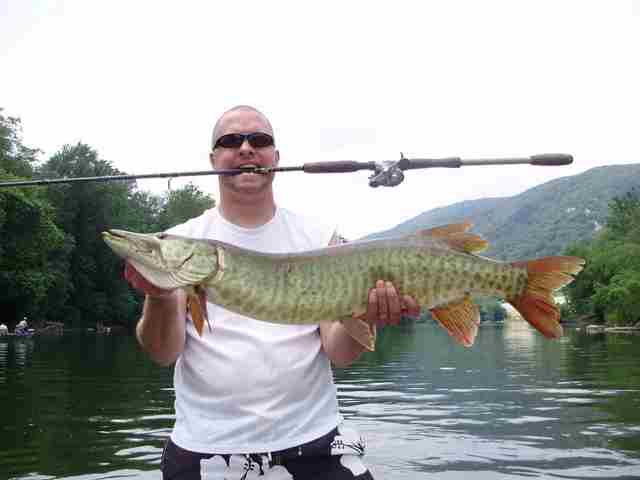|
|
Posts: 1828
| It seems that fishing a river with super low water levels, assuming weather etc. are not against you, could be like shooting fish in a barrel. Has anyone faced very low-water conditions and wished there was more water flowing? for reasons other than difficulty of passing shallow areas. |
|
| |
|

Posts: 20273
Location: oswego, il | Getting around is the biggest part. The wi river at portage is flowing around 1300 cfs and a couple months ago I fished it at 3200 cfs and much of it was unpassable then. I would not attemp my boat in there now and if I did expect to go far. |
|
| |
|

Posts: 16632
Location: The desert | Absolutely love when there is more water. Low water sucks. |
|
| |
|
Posts: 409
Location: Almond, WI | I know personally I've always preferred water high, it seems like the fish move very shallow and are feeding. I think the extra current from high water gets the whole system fired up. |
|
| |
|

Posts: 910
Location: South-Central VA | Low water is tough, not exactly like shooting fish in a barrel...wish it was! I much prefer to have the water a foot or two high rather than low.
jeremy |
|
| |
|

Posts: 20273
Location: oswego, il | Low water means less current and can spread the fish out. High water will reduce slack water for the most part and can concentrate the fish. There are a variety of factors to consider with that as well. |
|
| |
|
Location: Eastern Ontario | I think high water spreads the fish out through the whole system whereas I think low water stresses the fish and they fear being trapped and will move downstream back into the lakes or deep holes. I much prefer high water.
Nobody would watch my fishing show I fished all afternoon for a 32 inch fish, it's been a tough week.
Edited by horsehunter 9/28/2012 7:04 PM
|
|
| |
|
Posts: 3518
Location: north central wisconsin | As a river-rat by nature, I really like 'normal' water levels, which we have had very little of the past 4-5 years. But, if I had to choose, I would take my favorite rivers at 25-40% more flow than normal any day vs the 25-40% less that we are seeing this year. Fishing rising or high stable water here makes it easy, really, once one knows the wheres and hows. Definately saves on boat gas.
Edited by Reef Hawg 9/28/2012 8:21 PM
|
|
| |
|

Posts: 20273
Location: oswego, il | As a general rule high water decreases slack water and certainly decreases the slack water compared to a normal flowkng river. It can create new slack water along banks especially where a higher flow and water can create it. If you have a tree in the water breking current, that tree's current break diminishes with the flow. |
|
| |
|
Posts: 378
Location: On the River | Low water means fish will be less active. Current stimulates fish to feed |
|
| |
|
| I hate low water, I fished for 6 hours today saw 5 muskie only one follow and it was a lazy follow. Hoping for some rain soon! |
|
| |
|
Posts: 1828
| Wow, this is very insightful. Thanks for the feedback.
Three guys fished 8 miles of river on Saturday and did not see a fish. The water was quite low. I could not understand how they could be that negative. Last time I floated that stretch with one other guy, we caught three and lost another. It was low that day, two months ago, but not as low as it is now. |
|
| |
|
Posts: 9
| I fish this with jaultman, was along both times he mentions. Do muskies in real small rivers migrate in the fall? mind these are rivers with average depths around 2-5 feet this year. The deeper sections are separated by lots of shallow ripples and rapids 2-5 inches or less that I assume are impassable to fish. I have never seen a fish past the end of september. There are a few deeper corners but I can hardly believe they are enough habitat to sustain through the winter the number of large fish seen during the sumer. Thoughts? Experiences? |
|
| |
|
Posts: 3518
Location: north central wisconsin | I'd suspect migration type movements are common in most rivers though more noticeable in some of the smaller ones. Starting to realize that if the river is small enough, or the drawdown is severe enough, fish can completely leave the area for the duration of the low water/D.O. period, until the next spring/flush of water. I'm sure it depends on the severity of winters you have too. I don't want you to give out your spot here, but is this a tribuatary to another larger Musky river that might not be too far away? Or does this river get bigger a few or several miles downstream? Can all be clues perhaps. If there are areas where the river is only 2" across for any length, I'd consider it an isolation point and the fish either left when it was higher, find a deeper path through the riffle, or are still in the hole. There were a couple river stretches a friend fishes in WI that the fish never did move in to any degree this year based on the low water. These are stretches don't possess differing inluent flows/temps, so movement is almost entirely seasonal/water level based.
This is all very interesting to me, because I'm still really learning how different rivers and different stretches of the same river may have different degrees of migration and movements. To your knowledge, has your local DNR studied fish movements of any species to any degree in these rivers? Please keep us informed as to what you learn, and whether you find where the fish seem to have gone. |
|
| |
|
Posts: 1828
| I suspect the fish were still in there, just that they were extremely negative. Just like any lake, they can be on fire one day or during one time period, and then lock-jawed another day. It was just a major disappointment since we had been quite successful on previous outings. I'd rather blame it on "migration" than on my crappy fishing skills.
We still saw suckers, pike, etc., so I really don't think the muskies made a mass exodus. The fish would have to travel tens and tens of miles to reach any substantially deeper water. The river stretch in discussion has plenty of water deeper than 4 feet, even at the existing low water levels. |
|
| |
|
Posts: 4343
Location: Smith Creek | 20-30 miles is nothing for river muskies. Remember when water is low the the fish are more concerned with predators, so be as stealthy as possible. They still have to eat. |
|
| |
|
Posts: 81
| <p>Very intersesting topic as I experienced the opposite of most of these replies. I fish a river in the south, that is very small(30yard wide) and is relatively shallow (deep pools average 6-8ft) and most of the river is about 4ft deep. We had a extreme drought in 07' and we caught more muskies out of that river than most years. We contibuted it to our lures being in the stike zone more than ususal because of the low water(deep water >5ft was hard to find). The muskies hardly moved and were found in MOST of the same pools when it was normal(water was still the deepest in those pool). The fish seem to stack in those area!!!!! We did find one very deep pool(7ft) that held a lot of big fish. This same pool we hardly had any action in when the river was normal. So it seemed that the muskies in the pools were concentrated and we were able to get our lures in front of more muskies! July was the month that was particullarly awesome in this river. </p><p>As for migration, I am sure they do but sort of tough to prove unless you are tracking them. My friends and I have caught some of the same muskies a week apart up to 300yards away, but others seem to never leave the same pool or the same tree for that matter. Also I know an area of our river that is a 150y flat with one deep dredge hole in the middle and in the winter there are so many rehorse suckers migrating there it crazy! Sometimes you see muskies on the flat, but most are in the dredge hole in the winter! So if the bait migrates there I bet the muskies do as well! Hope this helps!</p>
Edited by NCmusky 10/5/2012 11:42 AM
|
|
| |
 Super Low River
Super Low River Super Low River
Super Low River